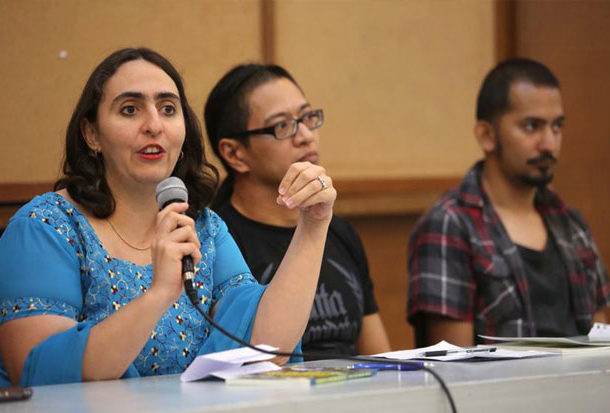
The outcome document from the National Consultation on a Malaysian Media Council:
The participants at the National Consultation reiterate that any moves to institute a media council are contingent upon the repeal of repressive laws that govern the media, in particular the Printing Presses and Publications Act 1984, the Sedition Act 1948, sections 233 and 211 of the Communications and Multimedia Act, along with review of the Official Secrets Act and the implementation of a Freedom of Information Act.
The Malaysian media needs an independent self-regulatory body to uphold standards of journalism, raising levels of professionalism, and provide an avenue for arbitrating public complaints. A media council which is open, accountable and transparent can help to build confidence in the media, contributing to the credibility of news media organisations.
Nonetheless, a media council which fulfils these functions can only be the result of a process of open and transparent consultation. Media freedom and responsibility are the concerns of all Malaysians, and the particular concerns of journalists and editors. Any process of constituting a media council must involve at the least key stakeholders, including journalist organisations, be transparent and responsive to the comments of the general public.
Given the commercial challenges faced by the local media, particularly from international social media organisations, there is an urgent need to enhance the credibility and public confidence in journalism and to build support for local actors for local media. Local media often produce content that is monetised by large foreign social media entities, and local support is vital in efforts to ensure that content producers are able to reap the benefits of their work.
While there is a need for urgency, for the process to be inclusive, there needs to be the opportunity for key stakeholders, particularly journalist organisations, to have meaningful consultation with their members. This process will involve building understanding about what a media council is, how it affects journalists and organisations, and how councils work in other jurisdictions.
Aims of the Media council:
- To defend, uphold, and promote media freedom
• Promoting a legislative and regulatory environment conducive to media freedom - Promotion and education of journalism as a public good.
• Target group: the public, stakeholders, media industry professionals
• This entails media literacy and journalism education. - An independent body that responds to public complaints, mediates complaints and advocates on behalf of media industry professionals.
• Code of ethics; sets the benchmark for journalism and professional standards, must include provisions of accountability and transparency across the board.
• Independent body to address complaints. - Protect journalists welfare and safety
• Safe working environment
Composition
The council should be composed of 13 members, comprising:
- 4 from editors/publishers (voted from amongst member organisations)
- 4 from Journalist Groups (voted from amongst registered journalist associations)
- 4 from public (nominated by anyone, with support letter from organisations, and voted on by member organisations and journalist associations)
- 1 Chair (Retired judge – chosen by Media Council)
- Minimum requirement of one woman from each of the three groups
- Stakeholder groups (no voting rights) – consulted by media council (eg Experts – academicians, lawyers, civil society groups)
There should also be provision for affiliates (e.g. FCC, Sabah/Sarawak media councils)
There was strong agreement from journalists from Sabah that any draft should allow for the establishment of regional media councils, if necessary from the perspective of local media practitioners. The regional media councils could be subsidiaries of the Federal body, and agree to uphold the Code of Ethics agreed at the Federal level.
Complaints procedure
The group agrees that there must be a supplementary body/ombudsman present to investigate, curate and filter the complaints before proceeding to the media council. The parameter of the complaint will be addressed according to the code of ethics and TOR. It is advisable to liaise with CMCF on identifying and establishing the content code that is applicable to the media council. Every member of the public can file a complaint regardless of status, with due regard for the privacy of complainants where applicable.
Complaints should be able to be submitted according to online webforms and hotline centres and will be acknowledged. An ombudsman will screen and filter the cases before submitting it to the media council. Selected members of the council will conduct an investigation and form a decision. The media council must issue a public statement on the resolution of cases.
Compliance
To get support from all stakeholders, rather than have the media council come across as an antagonistic entity. As part of the process in forming the media council, stakeholders and the steering committee should:
- have a proactive approach to issues affecting the media;
- start media literacy initiatives to get support from the public and CSOs;
- To initiate media education to get journalists and editors/publishers on board.
To help ensure compliance, the Council should educate media practitioners on the code of conduct and conduct annual assessments/ trainings. Further all editors and journalists should annually sign a Code of Ethics agreement, reiterating their commitment to uphold these principles.
- To draft/write the Code of Conduct for media practitioners (This would be a public document)
- To introduce penalties for non-compliance of the Code of Conduct (Proposing reprimands and sanctions but not punitive actions)
Code of Ethics
The code of ethics should aspire to the highest journalistic principles. It should be simple, concise, and deal with real ethical questions that journalists face every day. It should work towards greater ideals, as pervasive discriminatory beliefs and ideas in the media are likely to be replicated in a self-regulatory model and would not necessarily eradicate the problem. Thus a code of ethics aspiring to the highest standards would set the tone for Malaysian media actually playing the role of the fourth estate.
Next steps
A committee has been established to continue these discussions. While at present the committee consists of representatives from groups that were present at the National Consultation, the committee welcomes and encourages inclusion of groups who are not present, balancing between keeping the committee manageable and being representative. The majority of the committee should be practising journalists.
The committee will aim to have a meeting in the next three weeks; and to come up with a draft bill and/ or constitution by 30 April 2019. Drafts will build upon the discussions during the National Consultation. The committee will publish ongoing drafts online, which will be available for comment by all interested parties and members of the public, with clear deadlines for comment. All comments made will be published online and as an appendix to the document produced.
The committee will be facilitated by the Centre for Independent Journalism and the Malaysian Centre for Constitutionalism and Human Rights.
